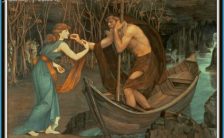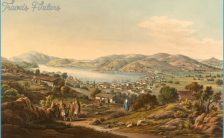Category: Greek Mythology
In the fifth century bc one of the most memorable of all Hades’ inhabitants is first mentioned: Charon, the ferryman who punts dead souls across the Acheron. Again, local …
The daughter of Atlas, Calypso (‘Concealer’) spent her days weaving at her loom, singing in her cave surrounded by: alders and poplars and sweet-scented cypress, the nesting-place of long-winged …
Despite being the setting of a well-known myth, little is known of Calydon until the time of its abandonment. Signs of occupation from the eleventh century bc suggest that …
Mythological Sparta is unlike the Sparta of Classical history. Early Sparta enjoyed a flourishing cultural and artistic life, but in the late seventh century bc this changed. Fearing defeat …
In the Iliad, none of the action takes place in Hades, but we do learn about it. Sited beside the River Styx’s icy waterfall and protected by a grim …
Four last conditions controlled Troy’s fate. The first was that Achilles son, Neoptolemus, a brave but brutal warrior, be summoned from Scyros. Neoptolemus helped in the fulfilment of the …
There are two Ithacas – one the modern island of Ithaki, the other the Ithaca of the Odyssey. Many have tried to reconcile them, for, if Mycenae and Troy …
Haides, Zeus and Poseidon, the mighty triad, ruled creation. In the Iliad, Poseidon outlines the arrangement: We are three brothers, born of Cronus and Rhea – Zeus, myself, and …



